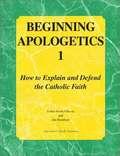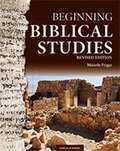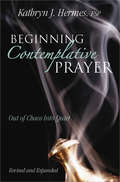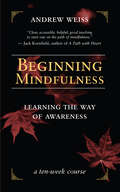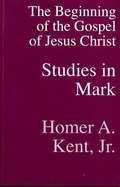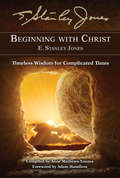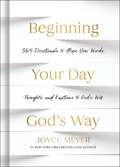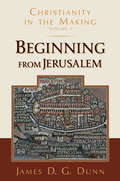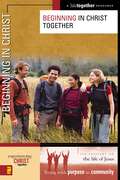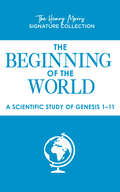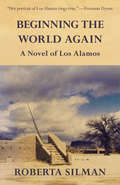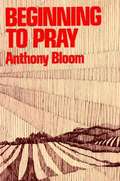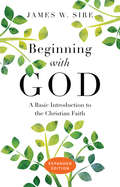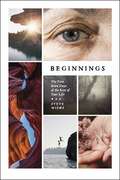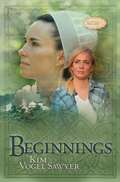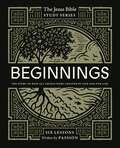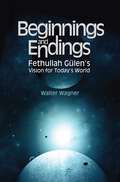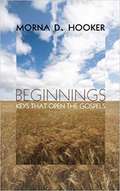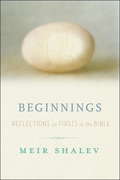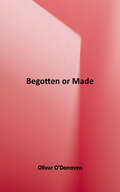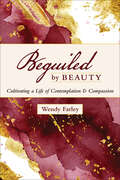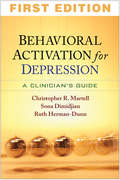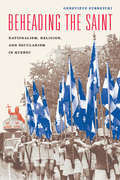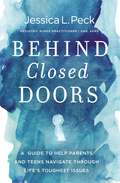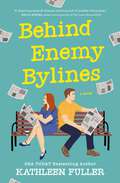- Table View
- List View
Beginning Apologetics 1: How to Explain and Defend the Catholic Faith
by Frank Chacon Jim BurnhamIn writing this booklet the authors hope it will give Catholics the basic tools to effectively answer the challenges of the many religious groups that come knocking on their doors and to correct some of the misconceptions non-Catholics have about the Catholic Church and its teachings.
Beginning Biblical Studies: Revised Edition
by Marielle FriggeThirty-three years of teaching Scripture and theology to undergraduates has given Marielle Frigge great insight into the needs of biblical study students and teachers. Unlike any other text on the market, this book does not assume familiarity with the contents or origins of the Bible or with the Bible's major events, characters, and themes. Beginning Biblical Studies, Revised Edition paints in broad strokes to provide readers sufficient context for reading and understanding the Bible. Revisions to Frigge's original text include fuller treatment of Jewish, Orthodox, and Protestant perspectives, updates for the most recent scholarship, a new appendix on archaeology and the Bible, plus more photographs, sidebars, and recommended resources, as well as revised appendices, time lines, and maps.
Beginning Contemplative Prayer
by Kathryn J. HermesIn this practical guide, best-selling author Kathryn J. Hermes, FSP, demonstrates how to begin a life of contemplative prayer. You don't have to be a mystic to learn this type of prayer, just a person who is seeking a deeper communion with God. Sr. Kathryn has helped thousands of people through difficult times. Now let her guide you in this timeless form of meditative prayer.
Beginning Mindfulness: Learning the Way of Awareness
by Andrew WeissA Simple Manual That Really Works Knowing that most people do not stop their lives to engage in spiritual practice, Buddhist teacher Andrew Weiss has always taught the direct application of practice to daily life. While also teaching sitting and walking meditation, he emphasizes mindfulness — the practice of seeing every action as an opportunity to awaken meditative inquiry. Over the years, Andrew has honed his teachings into an effective ten-week course with progressive steps and home-play assignments. Beginning Mindfulness is intended for anyone practicing in daily life without the luxury of long meditation retreats. Weiss skillfully blends the traditions of his teachers into an easy and humorous program of learning the Buddhist art of mindfulness.
Beginning Of The Gospel Of Jesus Christ: Studies In Mark (Kent Collection)
by Homer KentThis installment of The Kent Collection is a commentary that has been extensively rewritten and expanded from the author’s previous smaller work on Mark. A careful outline keeps the reader from getting lost in the great number of events portrayed in this shortest of the Gospels. Photographs aid in understanding the geographical setting of many events.
Beginning With Christ: Timeless Wisdom for Complicated Times
by E. Stanley JonesWorld-changers do not appear out of a vacuum. They follow the path lit by those who walk before them. E. Stanley Jones was a man who spent his life lighting the path. A missionary evangelist to India, Jones became friends with Mahatma Gandhi. Upon the assassination of Gandhi, Jones penned biography on his life. It is this biography that Dr. Martin Luther King, Jr credited with having inspired his non-violent resistance philosophy that would change the course of United States history, placing E. Stanley Jones as the link between these 20th century world-changers.E. Stanley Jones lived in and wrote for a complicated time. The 20th century saw not only the death, destruction, and horror of wars but also saw good resisting evil and the dignity of people standing together. In these complicated times of our own, these words still resonate with today. Perhaps these words can once again light the path for the world-changers of the 21st century.Abingdon Press is releasing a new compilation of E. Stanley Jones writings. Beginning with Christ: Timeless Wisdom for Complicated Times features selections from Jones's writings complied by his granddaughter Anne Mathews-Younes. With a foreword from Adam Hamilton, this book offers you the companionship of the man who shared the table of fellowship with Gandhi and inspired world-changers such as Martin Luther King, Jr. and Billy Graham. This collection is timely because these reflections are timeless.Beginning with Christ offers you the opportunity to discover these writings for the first time or sit again at the feet of E. Stanley Jones.
Beginning Your Day God’s Way: 365 Devotions to Align Your Words, Thoughts, and Emotions to God's Will
by Joyce MeyerBegin every day by connecting with God&’s truth and allowing it to transform your thoughts, your intentions, your feelings, and your reactions throughout the day. Each day, we have a new opportunity to make that day our best day. While we aren&’t in control of what happens to us throughout our days, we can learn to align our thoughts, our words, our emotions, and our actions with the way God has told us He wants us to live. This 365-day devotional from beloved Bible-teacher Joyce Meyer allows you to start each day rooted in the truth of God&’s Word and His ways so that no matter what comes your way, you will have the wisdom, the courage, the peace, and the self-control to allow God&’s light to shine through you, even in the darkest of circumstances. Complimented with scripture references and accompanying prayers, each daily entry brims with Joyce&’s time-tested wisdom as well as fresh inspiration to walk through your day with emotional stability, balance, and joy. Begin your day the right way, and live every day as your best.
Beginning from Jerusalem: Christianity in the Making, Volume 2 (Christianity In The Making Ser. #Vol. 2)
by James D. DunnThe second volume in the magisterial Christianity in the Making trilogy, Beginning from Jerusalem covers the early formation of the Christian faith from 30 to 70 CE. After outlining the quest for the historical church (parallel to the quest for the historical Jesus) and reviewing the sources, James Dunn follows the course of the movement stemming from Jesus &“beginning from Jerusalem.&” Dunn opens with a close analysis of what can be said of the earliest Jerusalem community, the Hellenists, the mission of Peter, and the emergence of Paul. Then he focuses solely on Paul―the chronology of his life and mission, his understanding of his call as apostle, and the character of the churches that he founded. The third part traces the final days and literary legacies of the three principal figures of first-generation Christianity: Paul, Peter, and James, the brother of Jesus. Each section includes detailed interaction with the vast wealth of secondary literature on the many subjects covered.
Beginning in Christ Together (Experiencing Christ Together)
by Karen Lee-Thorp Todd Wendorff Brett Eastman Dee Eastman Denise WendorffThe heart of Christianity is not a ritual or a structure, but a Person—Jesus Christ. But even as his followers, our vision of Jesus can get muddied by man-made theories of who he was. Whether you’re a seasoned believer or a brand new Christian, come walk in the footsteps of his first disciples to see him afresh: as Teacher, Healer, Shepherd, Servant, Savior, and Risen Lord. These six sessions lay the foundation for radical discipleship as our hearts are once again captured by who he is.Experiencing Christ Together helps your group explore the five biblical purposes that make up a high-impact Christian life —fellowship, discipleship, ministry, evangelism, and worship. Jesus perfectly lived out God’s purposes for his life, and he taught his followers how to do the same. As you walk in the footsteps of those first disciples by listening to and watching Jesus through these studies, you and your group will be transformed.One small group leader put it this way: “The Experiencing Christ Together series has motivated me more than any other Bible study that I have ever been to. This Bible study gets to the heart of the matter—my character in Christ—and that has created action on my part.”
Beginning of the World, The: A Scientific Study of Genesis 1-11 (The Henry Morris Signature Collection)
by Dr Henry MorrisIs Genesis Historically Accurate...and What Did Jesus Say? Analyze the impact of the unproven theory of evolution Examine Genesis and the scientific proof of Creation Evaluate the true synchronicity between the Bible and science If you have a deep love for the Bible but find it challenging to defend against intellectual arguments, this resource is invaluable. Dr. Morris empowers you and your church to withstand academic attacks and ridicule directed at the Christian faith. This book serves as an excellent guide for Bible teachers, study groups, and individual learners, catering to both scholars and laymen alike. The inclusion of discussion questions at the end of each chapter encourages thoughtful reflection and group engagement. A handy review of Genesis 1-11, The Beginning of the World gives insightful commentary into the stories most often labeled as “myth” by those who want to chip away at the Bible. Morris details amazing evidence that the first 11 chapters of Genesis are literal history that shapes us today.
Beginning the World Again
by Roberta SilmanAfter a chance meeting in 1981, Lily Fialka confronts the defining time of her life: 1943-45 in Los Alamos, when her physicist husband, Peter, worked on the atomic bomb as part of the Manhattan Project--a time of isolation, hard work, temptation, and loneliness, yet exhilaration and triumph; when great breakthroughs were made, but lives felt narrow; when loyalty was paramount, but the need for secrecy created unbearable tension. At the same time, Lily and her friends are haunted by what is happening to Dietrich Bonhoeffer in the Resistance in Germany, and his story serves as a counterpoint to theirs. In a sweeping historical novel that cuts across continents and reveals a deep knowledge of the science of the making of the bomb, Beginning the World Again offers valuable insights into that fascinating time.
Beginning with God: A Basic Introduction to the Christian Faith
by James W. SireChristianity begins with God and ends with God. It is a story for all to know and understand. In this personal and easy-to-read book, James Sire offers a basic introduction to the foundational truths held by Christians at all times and in all places. The chapters are organized around a simple scheme: creation, fall, redemption, new life in Christ, and glorification. In this expanded edition, Sire added a chapter on the person of Jesus. With study questions for personal or group use, this is the ideal first book for seekers and believers who want to understand the central teachings of the Bible.
Beginnings
by Steve WiensHave you ever found yourself at the beginning of a big life change? Maybe you’re getting married, or divorced. Maybe you’re having a child, or burying a parent. Maybe you’ve been promoted, or lost a job you loved. Maybe you’ve moved; maybe you feel stuck. These big changes hit us hard―it’s easy to lose our way. It’s easy to think that God is leaving us alone in them. The good news is that the God who spoke the world into existence, who lovingly brought into being everything seen and unseen, is speaking into your big change. Drawing from the story of creation in Genesis, Beginnings offers an empowering message of how God works through the transition in our lives. As God orchestrated the ultimate transition when he created everything from nothing, he can handle the overwhelming details in your life. Beginnings is for everyone who faces significant transition―in career, in relationships, in life stage, whether good or bad. By exploring the first chapter in Genesis―day by day, creative act by creative act―Steve Wiens shows us how beginnings work, and how God works through our beginnings.
Beginnings (Sommerfeld Trilogy #2)
by Kim Vogel Sawyer"BETH QUINN left the city to live among the Old Order Mennonites in the small town of Sommerfeld, Kansas, but she doesn't fit in. Her mother has embraced the old life and reconciled with her family, but these people are strangers to Beth and her business focus doesn't fit their ideal for women. With two men now vying for her attention, Beth is torn between a desire for independence and a longing to have someone on whom to depend. New in her Christian faith, will Beth be able to reconcile her old life with the new? Andrew Braun, a member of the Sommerfeld fellowship, works side-by-side with Beth, designing and constructing stained-glass windows. Dare she trust him with her life and her heart? Sean McCauley, whose dad owns a construction company specializing in erecting church buildings, visits Beth's shop and discusses a possible business deal. Is Sean interested in more than a financial alliance? Feelings of unsettledness begin to grow as Beth searches for a place to belong. Will she look to her heavenly Father for guidance and fulfillment? Or will she proceed with her own plans and wind up picking up more than pieces of shattered glass?"
Beginnings Bible Study Guide: The Story of How All Things Were Created by God and for God (Jesus Bible Study Series)
by Passion PublishingGod Has Included You in His Unchanging Story.In this beautiful Bible study series—brought to you by the makers of The Jesus Bible—you will dive in-depth into each of the six acts of God's story and discover a deeper understanding of your own unique story by learning how the two are intricately tied together.From the dawn of creation, God was thinking of you and designed your life to play a key role in the outworking of the grand story he's writing. He says to us, "Before I formed you in the womb I knew you" (Jeremiah 1:5). But if you're like most of us, it may sometimes seem as if your story is hopelessly off course.Through six weeks of interactive lessons, BEGINNINGS will usher you through the first act of God's unchanging story, weaving together key passages from the Old and New Testaments to help you get a better image of our creating God.The Jesus Bible Study Series is designed to lead you through the six main acts of Scripture:BeginningsRevoltPeopleSaviorChurchForeverThe series reveals how Jesus plays a key role in each and every story told throughout the Bible, and helps you discover God's purpose and plan for your life in his great story.
Beginnings and Endings: Fethullah Gulen's Vision for Today's World
by Walter H. WagnerWalter Wagner attempts to present a framework of understanding that outlines the philosophy and theology of Fethullah Gulen, a worldwide known scholar of Islam who inspired a global movement of education and interfaith dialogue. This book shows how Gülen's vision for the present and future makes the present and future forms of Hizmet an essential part of his wider and urgent call for the formation of a community of religiously committed and non-religiously committed persons to work toward a just, equitable and prosperous world now.
Beginnings: Keys That Open The Gospels
by Morna D. HookerThis book is about the "beginnings" or prologues to the four canonical Gospels, which refer to topics to be dealt with in what follows and offer guidance as to the particular way in which the author feels the rest of the book should be read. The beginnings also contain significant hints as to what the end of the story will be. Beginnings qualifies as a basic introduction to the contents of the Gospels and a helpful starting point for reading this literature. Using the metaphor a key that opens the door, Morna Hooker moves sequentially through Mark, Matthew, Luke, and John as, respectively, a "dramatic key," a "prophetic key," a "spiritual key," and a "glorious key."
Beginnings: Reflections on the Bible's Intriguing Firsts
by Meir ShalevThe bestselling and prize-winning Israeli author Meir Shalev describes the many "firsts" of the Bible #x13; the first love and the first death, to the first laugh and the first dream #x13; providing a fresh, secular and surprising look at the stories we think we know. The first kiss in the Bible is not a kiss of love. The first love in the Bible is not the love of a man and a woman. The first hatred in the Bible is the hatred of a man toward his wife. The first laugh in the Bible is also the last. In Beginnings, Meir Shalev reintroduces us to the heroes and heroines of the Old Testament, exploring these and many more of the Bible#x19;s unexpected "firsts. " Combining penetrating wit, deep empathy, and impressive knowledge of the Bible, he probes each episode to uncover nuances and implications that a lesser writer would overlook, and his nontraditional, nonreligious interpretations of the famous stories of the Bible take them beyond platitudes and assumptions to the love, fear, tragedy, and inspiration at their heart. Literary, inquisitive, and honest, Shalev makes these stories come alive in all their complicated beauty, and though these stories are ancient, their resonance remains intensely contemporary. From the Hardcover edition.
Begotten or Made?
by Oliver O'DonovanHow is it that we have so lost sight of the meaning of the human person that our very biological sex is seen as just another medical problem to be solved by technique? In a society that has rejected all moral norms, that refuses to honor God as Creator, what hope do we have of stemming the tide of scientific intervention into even the most sacred dimensions of our humanity? In this prescient volume, originally published in 1984, the eminent theological ethicist Oliver O’Donovan offers a penetrating analysis of our confusion over human nature and the proper boundaries of medical science. <p><p> O’Donovan exposes the assumptions that underlie new technologies that presume to “make” human life, and offers Christians the philosophical clarity they need to navigate the torrent of increasingly baffling ethical questions they face. <p><p> Today we need this wisdom more than ever, which is why the Davenant Institute is proud to be publishing this affordable new edition for the 21st century, complete with a new introduction by Matthew Lee Anderson and a retrospective by the author.
Beguiled by Beauty: Cultivating A Life Of Contemplation And Compassion
by Wendy FarleyContemplative disciplines, such as centering prayer and meditation, have been part of Christian life for centuries. They seem hard to practice now, not simply because our distracted and hyperstimulated age makes them difficult but also because they can appear irrelevant to the needs of a fractured and ugly historical moment. Yet these practices are more essential now than ever, claims Wendy Farley. These practices essentially awaken and attune us to the beauty both of the created order and of human relationships. Farley helps readers discover being made for both kinds of beauty, with contemplative disciplines immersing us in it. Tying these disciplines with contemplation allows us to engage with the struggle for justice in an unjust society. Beguiled by Beauty includes practical advice for readers to learn several contemplative-meditation practices.
Behavioral Activation for Depression
by Sona Dimidjian Christopher MartellFrom leading experts in behavioral activation research and clinical practice, this volume presents an empirically tested approach for helping clients overcome depression by becoming active and engaged in their own lives. Behavioral activation is a stand-alone treatment whose principles can be integrated easily with other approaches that therapists already use. Guidelines are presented for identifying individualized treatment targets, monitoring and scheduling \u201cantidepressant\u201d activities--experiences that are likely to be rewarding and pleasurable--and decreasing avoidance and ruminative thinking. Rich clinical illustrations include an extended case example that runs throughout the book. More than 20 activity planning forms, worksheets, and other reproducible materials are featured, which book purchasers can also download and print.
Beheading the Saint: Nationalism, Religion, and Secularism in Quebec
by Geneviève ZubrzyckiThrough much of its existence, Québec’s neighbors called it the “priest-ridden province.” Today, however, Québec society is staunchly secular, with a modern welfare state built on lay provision of social services—a transformation rooted in the “Quiet Revolution” of the 1960s. In Beheading the Saint, Geneviève Zubrzycki studies that transformation through a close investigation of the annual Feast of St. John the Baptist of June 24. The celebrations of that national holiday, she shows, provided a venue for a public contesting of the dominant ethno-Catholic conception of French Canadian identity and, via the violent rejection of Catholic symbols, the articulation of a new, secular Québécois identity. From there, Zubrzycki extends her analysis to the present, looking at the role of Québécois identity in recent debates over immigration, the place of religious symbols in the public sphere, and the politics of cultural heritage—issues that also offer insight on similar debates elsewhere in the world.
Behind Closed Doors: A Guide to Help Parents and Teens Navigate Through Life’s Toughest Issues
by Jessica L. PeckBelieve it or not, your kids WANT to talk to you about the social and health challenges they&’re facing. But are you ready? Jessica Peck, a pediatric nurse practitioner and mom of four, helps parents escape the secrecy and shame surrounding tough conversations and approach them from a Christian foundation.Today&’s teens are feeling more isolated, anxious, and depressed than previous generations, and are struggling with more complex challenges. Jessica Peck (DNP, APRN) has spent countless hours advising and encouraging parents after talking to their teens behind closed doors. In the privacy of her exam room, she has treated teens with mental illnesses, responded to suicide attempts, treated self-harm wounds as well as the emotional trauma of cyberbullying, sexting, pornography addictions, and numerous other issues. Through it all, Jessica found that teens really want to talk to their parents but don&’t know how.Jessica seeks to move the private conversations that happen in the clinic to relationship-building conversations at home. Behind Closed Doors is a guided lifeline to help you strengthen your connection with your kids. You will be able to:Get professional advice on tough teenage issues from a medical perspective, as well as the true stories of patientsDiscover suggested settings, activities, and question prompts to give you conversation keys to unlock doors for open dialogue on tough issues with your teensShare a time of reflection with devotional readings, relevant Bible verses, Scripture-based prayers, themed music playlists, and morePrompts to write 12 Legacy Letters: a generational keepsake for teensCovering topics including mental health, social media, suicide, sexting, gender identity, substance abuse (with a chapter focusing on vaping), and more, Jessica Peck's book will encourage and strengthen all parents—married, single, or divorced; grandparents, stepparents, godparents, bonus parents, adopted parents—anyone who is serving a parental role in a teen's life.
Behind Enemy Bylines: A cozy, low-spice, small-town romance brimming with early 2000s nostalgia
by Kathleen FullerFull of small-town charm, this latest cozy, low-spice romance from USA TODAY bestselling author Kathleen Fuller offers a second chance at love for one local reporter and his big-city accountant ex.Little Rock, Arkansas, 1995: Jade Smith's life has never been entirely stable. Bouncing back and forth between her mother and foster care, she learned that the only person she can really trust is herself. So when she starts to fall for newsroom reporter Sebastian Hudson, her defenses go up. When she gets a job offer from a company in Atlanta, Georgia, she immediately takes it, leaving Sebastian behind. He might have claimed to love her, but she knows no one sticks around for long.Clementine, Arkansas, 2005: Ten years after his heartbreak, Sebastian is back in his tiny hometown running the local paper and writing his slice-of-life column. The numbers in the accounting book are telling a story he's not ready to read, but he's refused to entertain any buy-out offers from big conglomerates, even as other small presses are being grabbed up, and in some cases, put out of business. He's determined not to let anything happen to the Clementine Times.In Atlanta, Jade is eager for the promotion that will finally provide the security she's always craved. There's only one hitch--her boss wants her to convince a small-town newspaper owner to sell his paper to their company. No big deal, right? Then she learns the owner is none other than Sebastian Hudson. Now it's a very big deal.Reunited for the first time since their awful break-up, Sebastian and Jade dig in their heels, refusing to see each other's side. But the small town of Clementine won't let them stay at odds with each other for long. Between a springtime hoedown, a dangerous apartment fire, Sebastian's slightly meddling younger sister, and the surprise appearance of Jade's younger brother, Sebastian and Jade end up discussing everything but business. They also rekindle past feelings.But when one of them makes an unforgivable decision, can they find their way back to each other? Or is this second chance the very last one?If you love low-spice, high-heart romances where the town is as much a character as the people in it, don't miss this tender tale of love lost . . . and maybe found again. Grab your copy of Behind Enemy Bylines and fall back in love with small towns, second chances, and the people who just might surprise you.
